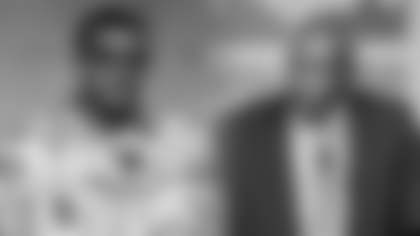ENGLEWOOD, Colo. — Months before newly elected Hall of Famer Peyton Manning ever played his first game for the Broncos and years before he capped his career with a world championship, he returned to his football roots.
As he began the second chapter of a career marked by a series of respected coaches — from Phillip Fulmer, Tony Dungy and Jim Caldwell to John Fox and Gary Kubiak — Manning headed to Durham, North Carolina to work with David Cutcliffe, his offensive coordinator at the University of Tennessee.
Cutcliffe, the head football coach at Duke University since 2007, helped Manning rehab from a series of neck injuries and return to full strength. After missing the 2011 season in its entirety, Manning returned to play four seasons with the Broncos, appear in two Super Bowls, win a world championship and slaughter single-season and career passing records.
When Cutcliffe and Manning started working together, though, the then-four-time MVP was a long ways from throwing touchdown passes.
"He could not throw the football from me to you at that time," Cutcliffe said. "He had tried to come back, and he was sending me clips and he was throwing a bit in Indy, because he didn't want to miss the start of another season. And when I saw them, I called him and I said, 'Stop throwing. You're going to hurt your elbow.'
"He wasn't ready. It took a lot of patience on his part. It took patience on mine. The framework I put it in was, 'Let's get well before we get back.' I'm glad that he listened to that, because a man like Peyton that's so achieved and has pushed himself, you want to push. But he had to get well before he got back."
Manning did that, and he helped carry the Broncos to Super Bowl XLVIII in his second season in Denver. That same season, he set the single-season touchdown mark with 55 touchdown passes and also broke the NFL's single-season passing yardage mark.
Cutcliffe wasn't coaching or leading Manning on a daily basis during his time in Denver, but he felt a strong connection to his former quarterback despite the distance.
"Joy, happiness," Cutcliffe said of his emotion when Manning broke a slew of records in Denver. "When all of these records fell, I actually had a tear. … He was my night job [in Durham] — late, late job — but when we would be headed home, he would be asking me, 'Should I be doing this?'
"[I'd say,] 'Peyton, I can't answer that. I can tell you you're making progress.' To know what he went through, the physical pain and emotional pain involved with it, to see that was just an amazing sight for me."
Cutcliffe is hardly the only coach with a story to tell about arguably the greatest quarterback in NFL history.
Dungy remembers Manning's ability to lead the Colts back from a 21-point deficit with four minutes remaining on "Monday Night Football" against the defending world champions. Kubiak recalls him jogging on the field against the Chargers to end the 2015 regular season and jump-starting a world-championship run. Fox can recall the craziness that followed Manning's rehab in Durham, as the Broncos wooed him to Denver.
Those coaches — along with Manning's high school coach at Isidore Newman in Louisiana — helped shape Manning. And they're all united in their belief that he is among the best of all time.
"It'll be the ultimate prize for him, I have no question about that," Fulmer said of the Hall of Fame. "He has represented every place that he's been in his life at the highest level. He deserves to slip that jacket on."
Manning's legacy is a little bit different to each of his coaches. Dungy, who spent seven seasons with Manning in Indianapolis, saw Manning as "the ultimate leader" that had unending drive.
"Wanting to improve, never being satisfied, always trying to get a little bit better," Dungy said. "That's what I remember about Peyton."
Kubiak — like several of the other coaches — saw Manning as a "special football player, but an even better person." In one season together in Denver, Kubiak saw Manning improve everyone's performance in Denver. He also saw a quarterback whose excellence at the line of scrimmage changed the game — and the Broncos' chances of winning Super Bowl 50.
"We all knew who the leader of the team was, and if we were going to get there in a storybook fashion and win a championship that year, it was going to be because we had him back on the field," Kubiak said.
Caldwell, who was Manning's head coach for a handful of seasons to end his stint in Indianapolis, had his own coaching philosophy impacted by Manning's work ethic.
"I thought I was an extremely hard worker until I met him," Caldwell said. "I thought I was extremely organized until I met him. I thought I was fairly rigid in terms of — I love a routine, but I'm not superstitious, but I love a routine. But he is also much like that. Things had to be the same. We kind of gravitated toward each other because of that. But he could go to higher heights than anyone I think you could ever imagine.
"Often times I tell people, when you hear about his accolades, multiply it by 100, then you might get a sense of who you're dealing with."
And Fox, who coached Manning for three seasons in Denver, believes the quarterback's dedication to his craft helps him stand among the all-time greats.
"I think it says a lot about him as an athlete, and a big reason why he's a first-ballot Pro Football Hall of Famer is just his dedication," Fox said. "… Not many guys are that dedicated and that committed, and it's a huge reason why he's got two Super Bowl rings with two different organizations, which in itself is pretty remarkable.
"… Even here after I left when Gary came in, it probably wasn't his best individual season, but he went through a lot … stuck to it, and there may not be any better picture of a guy not giving up and fighting through some adversity and then the ultimate goal hoisting that Lombardi Trophy at the end of that '15 season. It gives me chills."
In a few months, those coaches should likely have the chance to see Manning slip into his gold jacket in Canton, Ohio and be enshrined into the Pro Football Hall of Fame.
"It's going to be a magic moment for many of us," Cutcliffe said.














